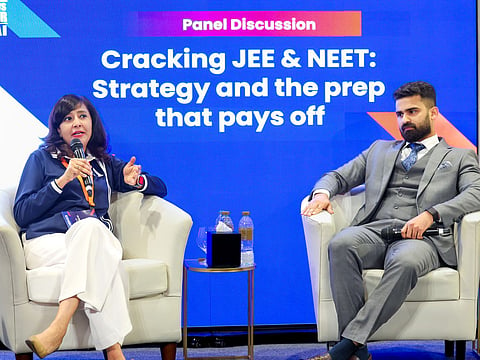Gulf News Edufair 2025: What it really takes to crack JEE & NEET
Top educators break down how to beat India’s most competitive entrance exams

When it comes to India’s toughest entrance exams, JEE and NEET, it’s not the brightest students who always make it, but the ones who refuse to break pace. That was the takeaway from the panel discussion titled Cracking JEE & NEET, at Gulf News Edufair 2025, where Alka Malik, Founder of Ascentria, and Ameen K Head of Operations, Unique World Education, shared the truth behind acing these high-stakes, high-pressure challenges.
“JEE stands for Joint Entrance Examination, and it’s the only way into India’s most elite engineering institutions, the IITs,” explained Ameen. “Similarly, NEET is mandatory for students who want to pursue medicine. Whether you’re in India, the UAE or Europe, you can’t work as a doctor in India unless you clear NEET and then FMGE after MBBS.” The scale is staggering. JEE sees up to 1.5 million students vying for just 15,000 IIT seats. “That’s a 1 per cent success rate,” said Malik. NEET is even more competitive, with 2.3 million students sitting for it in 2024 and an expected 2.6 million in 2025.
But when should students begin preparing? Ameen believes earlier is better. “We recommend starting from Grade 8. Concepts like motion, which are tested in Grade 12, begin early. Building a base in physics, chemistry and biology from middle school helps students grasp advanced concepts later.” Malik, however, takes a more pragmatic view. “The syllabus is officially taught in Grades 11 and 12. What comes before is foundational, but often veers into premature tuition. Grade 11 is the right time for serious prep, backed by basics laid down in Grade 9.”
Both agree that the key is consistency. “The Grade 11 syllabus is ten times heavier than Grade 10,” said Malik. “You can’t cram this. Daily revision and a disciplined schedule are essential.” At Unique World Education, students are provided physical notes, a dedicated app, and access to recorded lectures and mock tests. “Speed and accuracy matter,” said Ameen. “In competitive exams, you have to solve questions in under a minute. That takes focused, relentless practice.”
While some students manage without coaching, it’s rare. “They need exceptional self-discipline and the right resources,” said Ameen. Malik added that self-study can work, but students miss out on peer benchmarking and structured learning. “Coaching helps with accountability. You know where you stand.”
Mental health is just as critical. “Every student hits a wall,” said Malik. “The only solution is to talk, whether it’s with parents, mentors or friends. At Ascentria, we check in regularly and help students revise their plans if they feel stuck.” Ameen’s team connects students with seniors who’ve cracked these exams and brings in hospitals like Aster for wellness sessions. “We even have counselors and mentalists on board. For us, student well-being is non-negotiable.”
Sleep, nutrition and routine aren’t just add-ons; they’re part of the plan. “We’ve seen students give up smartphones and switch to basic phones to cut distractions,” said Malik. “That kind of commitment isn’t just admirable, it’s necessary.” Ameen agreed: “Our role goes beyond academics. If a student isn’t sleeping well or managing stress, it affects performance.”
When it comes to preparation mistakes, both panelists have seen it all, from students ignoring changes in the syllabus, starting too late, or jumping between too many study resources. “Stick to one material and master it,” advises Malik. “Consistency trumps intelligence.” Ameen added, “Too many students think the exam is easy or delay preparation to Grade 12. That’s a major error.”
Parental involvement can be a double-edged sword. “There are parents who micromanage and others who disappear,” said Malik. “Both approaches are harmful. What students need is steady, supportive guidance.” Ameen agreed: “I’ve had top-performing students whose parents thought they weren’t doing enough. Let them take breaks. Talk to mentors. Be a support system, not a stressor.”
Mock tests, the experts said, are the backbone of preparation. “We conduct weekly tests and monthly mocks,” said Malik. “Scores aren’t used to shame but to push healthy competition.”
At Unique World Education, students solve from a pool of over 200,000 questions. “We track speed and accuracy. It’s not about getting it right, it’s about getting it right fast.”
Ultimately, success is a mindset. “One of our toppers ranked 31 in JEE Mains,” said Malik. “What set him apart? He enjoyed the challenge. He wasn’t just chasing marks; he loved the process.” Ameen pointed to perspective: “A government seat costs less than ₹25,000. An NRI seat? ₹35 lakh. When students realise what’s at stake, their mindset shifts.”
Asked to summarise the formula for success, both experts delivered with impact. “Practice. Practice. Practice,” said Ameen. Malik closed with: “Consistency. Focus. Determination.”
Sign up for the Daily Briefing
Get the latest news and updates straight to your inbox



